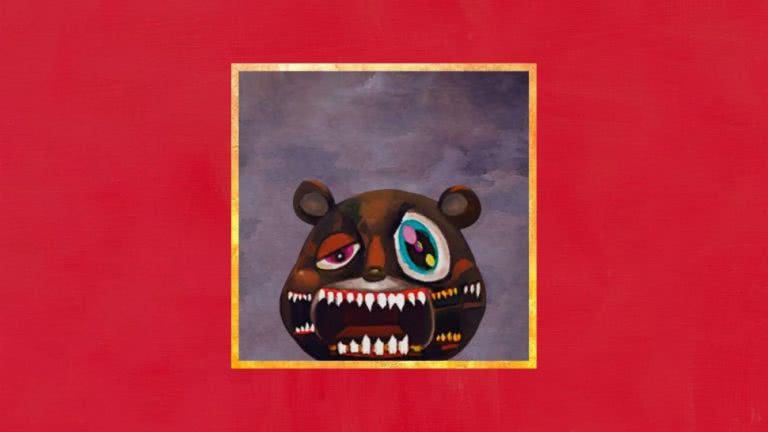More than 10 years ago, on November 22nd 2010, Kanye West released My Beautiful Dark Twisted Fantasy, one of the defining albums of the 21st century.
It was a tumultuous time for West. The rapper had recently broken up with his model girlfriend Amber Rose; his public image had been ruined by the infamous Taylor Swift row during the 2009 VMAs.
His fifth album, then, offered solace. He underwent a much-required self-imposed exile from the fame and infamy. West relocated to Hawaii, inviting along several noteworthy producers and artists as varied as Bon Iver’s Justin Vernon, Rihanna, Drake, and Elton John.
What followed was a time of inspired creativity. The days were long and the breaks were few, West frequently sleeping for mere 90-minute intervals. The result, though, was a hugely ambitious and powerful work. The album encapsulated – as close as it possibly could – the complexities of West the person: fragile and fractious, maddening and ingenious.
It was hip-hop capable of being treasured by both the mainstream and the underground, a tremendously difficult feat that few have truly managed (perhaps Kendrick Lamar is the only other example in the last decade). The album was a mea culpa, a necessitated apology after all that 2009 brought.
It was a personal rather than a musical comeback though. For all its overwrought auto-tune issues, 808s & Heartbreak still sold well. Here was the megalomaniac of music acknowledging his reputation and reckoning with it. The critics lapped it up (Pitchfork gave it a perfect 10 score, the last album to achieve this until Fiona Apple a decade later).

My Beautiful Dark Twisted Fantasy somehow found the accomplishment to match its ambition. Huge moments abound. Every song was overwhelmed – in the best sense of the word – by involvement. Literal gangs of guest vocals; incredible samples (sampling prog-rock band King Crimson on ‘POWER’ was a moment of blinding inspiration); there was wild orchestration; there was his ubiquitous incessantly twinkling beats.
Love Hip Hop?
Get the latest Hip Hop news, features, updates and giveaways straight to your inbox Learn more
The opener ‘Dark Fantasy’ offered immediate impact. There was his powerhouse comeback single ‘POWER’ with its instantly memorable choral chanting. ‘All of the Lights’ can still claim to be one of his finest career moment of production. Thickened with atmospheric horns and group vocals, it’s a timeless hip-hop classic.
Then there’s ‘Runaway’. It opens with a sparse and stunning piano line that continues to melancholically run through the song. West unravels some of his most personal and honest lyrics atop it: “And I always find, yeah I always find somethin’ wrong / You been puttin’ up wit’ my shit just way too long,” are the aching first lines.
The tongue-in-cheek refrain then upends any seriousness as he says, “Let’s have a toast for the douchebags/ Let’s have a toast for the assholes/ Let’s have a toast for the scumbags/ Every one of them that I know/ Let’s have a toast for the jerk-offs.” It runs for nine minutes but never tires the listener. Not when he poured out his usual careless singing, not even during a fuzzy and repetitive outro, such is the depth of meaning and level of control.

West was the visionary but he was ably assisted throughout by his collaborators. Frequent partner Kid Cudi sung delicately on ‘Gorgeous’. ‘Blame Game’ featured the soulful delivery of John Legend and also a surprising monologue from comedian Chris Rock. The record’s standout commercial hit, the aptly-titled ‘Monster’, was stacked with guest spots from Justin Vernon, Rick Ross, Nicki Minaj, and Jay-Z (a lesser artist would pray to work with just one of those four).
Secondary guests may flit in and out but the main character remained clear. Kanye West is our guiding light, our abrasive antihero (arriving at the onset of television’s antihero period of Mad Men and Breaking Bad, intriguingly), our depressed hedonist.
Looking back 10 years later, My Beautiful Dark Twisted Fantasy seems like the halcyon point of West’s career. The music – Yeezus, The Life of Pablo, Ye, and Jesus Is King – have found mixed reaction. The decade has been marked by chaos and controversy.
Business has increasingly suffocated his vision. His Yeezy brand has gained his focus. Bill Gates and Elon Musk have appeared as touchstones more than Jay-Z or Nas. We’ve witnessed ill-advised leaps into politics, flirtations with fascist presidents, religious awakenings, Twitter meltdowns and obvious mental health struggles.
It’s nice, in a way, to be afforded this opportunity to admire Kanye West for what he is above all else: a supreme, generational musical talent. One hopes that he can remember this again soon enough.





































